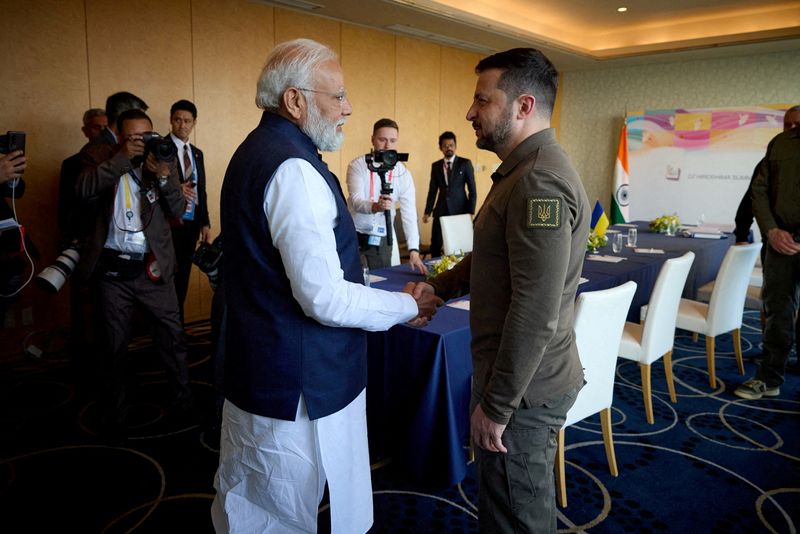By Tom Balmforth and Pavel Polityuk
KYIV (Reuters) -India’s Narendra Modi arrived in wartime Kyiv on Friday for talks with President Volodymyr Zelenskiy, the primary journey by an Indian prime minister to Ukraine since Kyiv gained independence from the Soviet Union in 1991.
The go to comes at a unstable juncture within the battle in Ukraine, with Ukrainian forces nonetheless in Russia’s western Kursk area following their incursion on Aug. 6 and Russian troops grinding out gradual however regular advances in Ukraine’s east.
The go to, which follows a visit by Modi to Moscow in July, is vital for Western-backed Kyiv, which has been attempting to nurture diplomatic relations within the International South in its efforts to safe a good settlement to finish the battle.
“I look forward to the opportunity to … share perspectives on peaceful resolution of the ongoing Ukraine conflict,” Modi mentioned earlier than the journey. “As a friend and partner, we hope for an early return of peace and stability in the region.”
Modi’s go to to Moscow final month coincided with a heavy Russian missile strike on Ukraine that hit a kids’s hospital. The assault prompted Modi to make use of emotive language to ship an implicit rebuke to Putin at their summit.
However the journey elicited fierce criticism from Zelenskiy who mentioned it was a “huge disappointment and a devastating blow to peace efforts to see the leader of the world’s largest democracy hug the world’s most bloody criminal in Moscow on such a day”.
Mykhailo Podolyak, an adviser within the Ukrainian president’s workplace, instructed Reuters Modi’s go to to Kyiv was vital as a result of New Delhi “really has a certain influence” over Moscow.
“It’s extremely important for us to effectively build relations with such countries, to explain to them what the correct end to the war is – and that it is also in their interests,” he mentioned.
India, which has historically had shut financial and defence ties with Moscow, has publicly criticised the deaths of harmless individuals within the battle.
However it has additionally strengthened its financial ties with Moscow after Western nations imposed sanctions on Russia and reduce commerce relations with it over its invasion.
Indian refiners which hardly ever purchased Russian oil prior to now have emerged as Moscow’s high shoppers for seaborne oil since Russia poured troops into Ukraine in February 2022. Russian oil accounts for over two-fifths of India’s oil imports.
PEACE VISION
Ukraine has mentioned it hopes to convey collectively a second worldwide summit later this yr to advance its imaginative and prescient of peace and contain representatives from Russia.
The primary summit in Switzerland that pointedly excluded Russia in June attracted scores of delegations, together with one from India, however not from China, the world’s second largest financial system.
“Lasting peace can only be achieved through options that are acceptable to both parties. And it can only be a negotiated settlement,” Tanmaya Lal, Secretary (West) within the Indian international ministry, instructed reporters.
“This is an important visit that is expected to catalyze our ties in a whole range of sectors,” Lal mentioned, itemizing financial and enterprise hyperlinks, agriculture, infrastructure, well being and schooling, prescription drugs, defence and tradition.
Volodymyr Fesenko, a Kyiv-based political analyst, mentioned he anticipated no breakthrough proposals to be made to finish the battle throughout the journey by Modi, who visited Poland on Thursday.
For there to be an try to barter, the navy state of affairs has to stabilise and the presidential election have to be held in america, a detailed ally of Ukraine, he mentioned.
He mentioned the go to was vital for India to show it was “not on Russia’s side” and that Kyiv needed to normalise relations after Modi’s Moscow journey.

Richard Verma, U.S. deputy secretary of state for administration and assets and a former U.S. ambassador to India, mentioned on Wednesday that the journey to Kyiv was vital.
“I appreciated some of the things that the prime minister has said, that this is not the time for war, this is a time for peace, but this is a very consequential period for the defence of liberty, freedom and the rule of law,” he mentioned.




